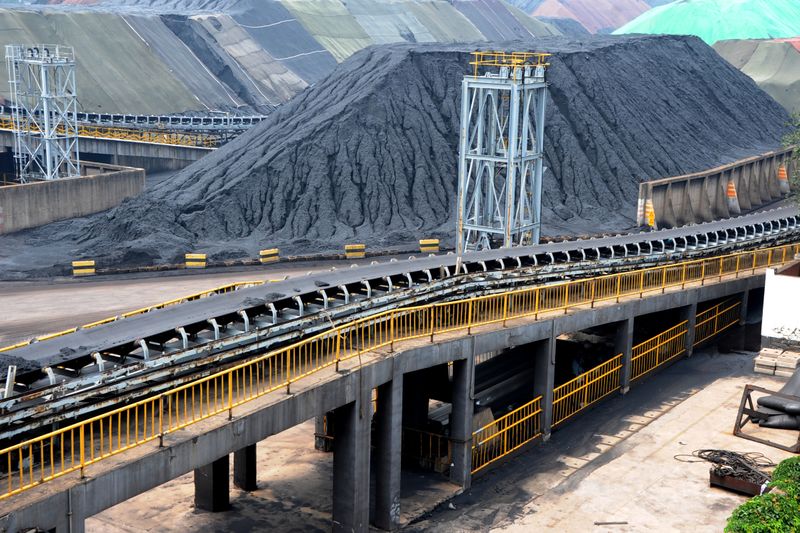By Clyde Russell
LAUNCESTON, Australia (Reuters) - (The opinions expressed here are those of the author, a columnist for Reuters.)
China's imports of major commodities in September showed an increasing divergence between energy and metals, with coal and natural gas soaring while copper and iron ore struggle.
The imports data are starting to mirror the overall dynamic apparent in the world's second-biggest economy, where shortages of power generation and heating fuels have started to crimp the ability to make energy-intensive products such as refined metals.
The notable exception to the strength in energy imports is crude oil, with September arrivals remaining soft amid high prices and a lack of available import quotas for the independent refining sector.
Coal imports were the headline-grabber in the September data, with arrivals of all grades coming in at 32.88 million tonnes, the most since December's 39.08 million, the second-strongest month in the past 20 and a leap of 76% from the same month in 2020.
China has been ramping up coal imports in recent months as domestic output has struggled to meet rising demand for electricity, leading to shortages and power rationing in some provinces.
Much of China's coal woes are self-inflicted, with mine closures for safety inspections contributing to lower-than-potential domestic output, and an unofficial ban on buying from Australia for political reasons hurting imports.
The overall impact has been to drive both Chinese domestic prices and Asian spot seaborne coal to record highs.
Domestic thermal coal futures on the Zhengzhou exchange thermal coal futures touched a record of 1,640 yuan ($254.44) per tonne on Wednesday, having surged almost three-fold year-to-date.
Australian Newcastle coal futures traded on ICE (NYSE:ICE) ended at $243.35 a tonne on Wednesday, just below the all-time high of $244.50 on Oct. 11 and up 202% from the end of last year.
China's September imports of natural gas, both from pipelines and as liquefied natural gas (LNG), totalled 10.62 million tonnes, a nine-month high and 22.6% above the volume for the same month in 2020.
Natural gas imports have jumped 22.2% in the first nine months of the year as China continues to switch industrial boilers and residential heating over the cleaner-burning fuel from more polluting coal.
In turn, Asian spot LNG prices have surged along with Chinese demand, as utilities in countries including Japan and South Korea try to ensure that they aren't caught short of supplies, as they were during a colder-than-usual winter over 2020-21.
The weekly spot LNG price climbed to a record high of $37 per million British thermal units (mmBtu) in the week to Oct. 8, having gained 560% since its 2021 low of $5.60 per mmBtu in late February.
It's worth noting that relatively small volumes of LNG actually trade at the spot price, as the majority of the super-chilled fuel is sold under long-term, crude-linked contracts and when spot prices surge, only the most desperate buyers will still be in the market.
SOFT CRUDE, METALS
China's demand for crude oil hasn't joined the surge for coal and natural gas, staying muted in September with imports of 9.99 million barrels per day (bpd), down from August's 10.49 million bpd and the 11.8 million bpd from last September.
For the first nine months of the year, crude oil imports have dropped 6.8% from the same period in 2020 to about 10.36 million bpd.
China is the world's largest crude importer and the slowing of purchases reflects several factors, including the decision to use up stockpiles of cheap oil bought during 2020's price collapse, ongoing coronavirus pandemic travel restrictions, the lack of available import quotas and official disquiet over the strong gain in prices prompted by output curbs by the OPEC+ group of exporters.
China has also started selling crude from its strategic reserves in an attempt to moderate prices by limiting import demand, a strategy yet to have much influence on a global market more focused on bullish factors outside of the main importing region of Asia, where demand remains stagnant.
China's energy shortage is also starting to show up in imports of metals, with steel-making ingredient iron ore dropping to 95.61 million tonnes in September, down 1.9% from the prior month and 11.9% from the same month in 2020.
Restrictions on steel output from both pollution control and energy conservation perspectives are dampening demand for iron ore, a trend likely to persist over the upcoming winter.

Imports of unwrought copper did eke out a 3% gain in September from the prior month, rising to 406,000 tonnes, but this was down a massive 43.8% on the 722,000 from last September, and was the second-weakest month since August 2019.
High global prices and muted manufacturing growth have tempered demand for copper, and with energy restrictions likely to continue in coming months, demand for the industrial metal may remain soft.